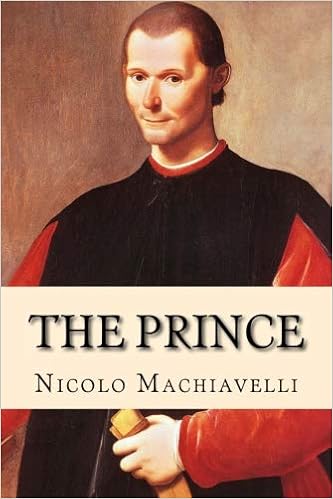While I believe The Prince is an important read and gives an excellent historical context of the world of Machiavelli's time, as well as an ingenious overview of the many facets of power/politics, ultimately I believe that when looking at the big picture much of The Prince is flawed. Despite the interesting and valid insight offered up in the book. I don't think the book accomplishes what it claims to, which is what I base my claim off of—meaning that Machiavelli uses the advantage of 20/20 hindsight regarding past rulers and events that he criticizes while making claims about paths to success that aren't specific, tested or supported in any way.
I think my point is best described using an analogy that came up in the debate: the idea that Machiavelli's theories (specifically talking about generosity) are similar to forming a pizza dough that is even and not spread too thin. If I was to extend this metaphor to encompass the flawed aspects of The Prince, my "pizza-synopsis" would look something like this: "Make sure there aren’t holes in the dough, don’t put cheese on only one part of the pizza, make sure to bake it for the right amount of time. My claim is supported because when some other dude burned the pizza it was because he left it in too long, or he didn’t put enough sauce on it b/c it was too dry."
Even if this analogy is confusing/doesn't make a whole lot of sense, the idea is that Machiavelli has more in common with a whiny food critic who states the obvious without giving any specific out-of-the-box instructions.
While the contradictions, hindsight criticism and over-generalizations in the book make me hesitant to state that "Machiavelli was basically right", I still believe that The Prince has value to us today and should be read. Its true that the content doesn't necessarily give a reader an effective guide on leadership, the style in which the book was written was revolutionary for its time and the realism/commentary combination is still fascinating for us today. It also helps us to dive into the time of Machiavelli's life; therefore, we may glean a better understanding of the historical context that he writes in. Finally, although his advice may be flawed and not meet the expectations Machiavelli sets for it, the content is still interesting and thought-provoking (if not specific or easy to practically employ).

I really like how you mentioned that pizza dough effect because it is a crutch that Machiavelli uses to support many of his claims. I enjoyed the creativity of your analogy, and I like how you pulled everything together at the end by acknowledging that Machiavelli work was still an impressive piece. Personally, I think that many of Machiavelli's views are bizarre and extreme, however, though not always ethical, if we are arguing how someone could maintain power, then his argument would be strong.
ReplyDelete